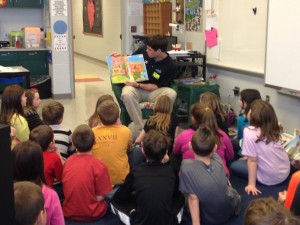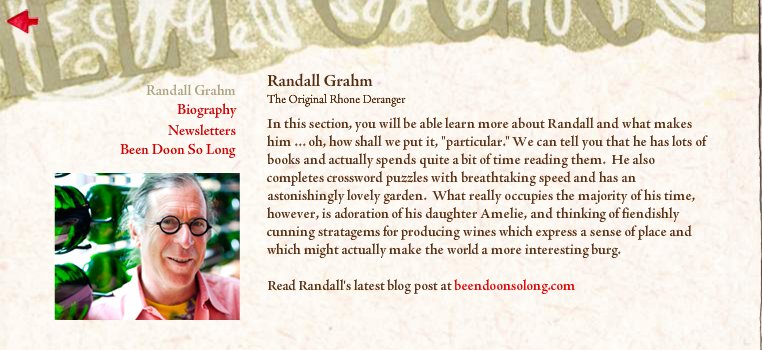 It’s unfortunate, the words “Tell a story” have become as cliché as “be authentic.” But we all love a good story, and some are good at storytelling while others, not so much.
It’s unfortunate, the words “Tell a story” have become as cliché as “be authentic.” But we all love a good story, and some are good at storytelling while others, not so much.
Whether you are speaking publicly, at a cocktail party, doing a video or writing, we can all do better at storytelling. In fact, if I don’t stop working on this post and publish it, I’ll never be able to tell you this story.
Let’s take Bonny Doon Vineyard as a prime example of entertaining and informative storytelling.
Show me anything on their site that mentions their “state of the art equipment” or “world class wines” or XX,000 square foot facility. Nothing.
Instead, you are greeted by a “Meet Our Leader” page and an interesting story about a man who “reads the books on his shelves,” has an undying love for his daughter, and wants to make the world more interesting with better wine:
The “Learn Our Ways” page talks about the use of screw caps vs. corks in “Are you getting screwed?” and argues that wine making isn’t really wine making
“any more than he (or she) is responsible for converting the sunlight that strikes the leaves of the grapevines into sugars…”
Clearly Randall Grahm is a fascinating character with loads of personality. He might have employed a great writer (unless he writes it himself) who is able to translate his ideas to compelling web copy.
We should all be so lucky. To have a charismatic leader and a great subject matter certainly gives a content marketer more to work with and makes the task fun.
I’m imagining your “buts” right now: “We produce catalytic converters,” “We sell Xerox machines.”
It might be idealistic to think you’ll become a destination with your content, but I think we can all agree, you can tell a better story than you are doing so now.
A Few Ways To Tell a Better Story
Think about structure
Stories aren’t always chronological. Start off with a punch – something of interest that draws the reader in, is critical. Before I buy fiction, I always read the first sentence.
There are a few ways you can go about doing this.
What is the point? What do you want your audience to leave with? How do you want to change them?
Make an emotional connection. I’m going to tell you what that means and how to do it. Dove’s Real Beauty Sketches tell a great story. We all know we are our own worst critics when it comes to self-image. You’re not selling your product. You’re selling an outcome.
What is your outcome? That is your story.
I started my talk at the Vocus Demand Success Conference on the SEO of Content with a story about my dog Jackson. I chose the story to illustrate how content led me to a solution to a very stressful incident – his health issues. I checked my tweets afterward and a handful of people had sent me photos of their own pets.
When you get personal you make real connections. But that’s not all. I started the discussion with the outcome. I shared what Nancy Duarte would call the end bliss. “Here is the solution to the problem and if you stick with me through this story, you too, will find your end bliss.”
Start with a sense of mystery or foreshadowing. Pull things out of context to give it heightened interest and compel the reader to wonder how it relates. Are there interesting characters or components to the story you can bring to the front? The book Born to Run has on it’s cover: “A Hidden Tribe, Superathletes, and the Greatest Race the World Has Never Seen.” That means sometimes you write the first sentence last. You don’t have to write stories from top to bottom.
Self-edit.
Write in active voice. You’ll be amazed at how much active voice improves your writing style and readability. Take for example, “I’ve been owner of my own restaurant for 10 years.” I’ve owned restaurants for 10 years. I would like to find a better example but I really need to publish this post. The point is, it forces you to use more active, beautiful verbs. Rather than “been” you have “owned.” Stop using been, is and was so much.
Prune the unnecessary stuff. I find myself editing people’s stories as they tell them to me. “Then she walked in the door and she asked, and then he said, and then she said…” You don’t have to give a chronological history. “They briefly discussed the options and decided to….” Don’t bore us with the details when we just need to know the outcome.
Be economical with words. Can you use one word instead of four to describe the situation? Eliminate words like actually, very, all, amazing, and incredible. They don’t mean anything and rarely add value. We only use a small percentage of the English language. Stretch that. Someone needs to develop an app so we can gamify the percentage of language we use. But I digress. Pay close attention to your word choices.
Read more! For those of us who enjoy reading fiction, the good news is we just need to keep reading quality fiction. And magazines. As you read, pay attention to more than just the story. Watch how the author chose to tell it, how it’s structured, and his or her word choices.
Lastly, sometimes it helps to just start writing. Don’t even worry if you hate it as you write it. You can go back and fix it and pull the interesting gems to the top.
That’s my story for today!
PS, if you have more time. This is why I love Randall Grahm, winemaker at Bonny Doon Vineyards.
Download From Transactional to Transformational: Elevate your organization’s positioning with effective storytelling.
[ssba]
Good stuff, as always, Lisa. Speaking of “sites that speak” (ooo, I like that) check out this beauty. I love the presentation and stories about how this micro brewery came into being: http://solemnoathbrewery.com
Oh, that looks great. gonna spend some time there. Thanks. I kind of need to get my butt in gear for a certain someone’s winery website. Sigh.
And I get to drink there. It’s only two miles from my house.
Ha, I am constantly editing people’s stories in my head, too. “Why are you telling me the name of this minor character we’ll never hear from again? What does it matter whether this happened in April or March? Focus! Get back on track!”
RIght??!?!?! You so get me. 🙂
I want to say, yeah yeah yeah, I get all that. Skip to the part where it matters.
Interesting topic, and one that I just commented on here “Does Good Writing Stiill Matter?” http://claymanmarketingcommunications.wordpress.com/2013/07/17/does-good-writing-still-matter/
Yes, yes, yes! It’s so important to weave a story like a tapestry, to draw people in, to make them feel something, do something. Like a beautiful song or a photo or a piece of art, the art of telling a story lies in one’s ability to bring that person into that space and time, to entertain, educate, inform or have them “feel”, and walk away better for having read it. Cheers! Kaarina
Beautifully said!!! And I feel so fortunate it’s what I do for a living. It’s pretty fun. Now i have to go check out Margie’s post.
True – telling better stories has become a popular mantra as of late. And while it might be cliche, it’s an absolute necessity. That’s exactly what I told a client yesterday – they need to let their hair down and actually tell their story. It makes all the difference between a stale company and one you want to do business with.
Huge difference. I have a client where that’s a challenge because they just aren’t forthcoming – I ask questions and get boring answers. Which is why having a client like Randall Grahm sounds like a dream to me!